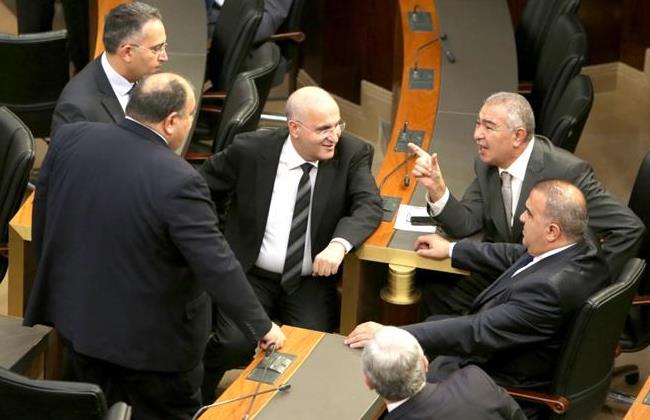MPs In Lebanon fail on presidential election, prepare to extend Parliament’s term
Oct. 30, 2014/Hasan Lakkis| The Daily Star
BEIRUT: Parliament will vote next week on a bill that would extend its mandate by over two years, Speaker Nabih Berri said Wednesday, shortly after the legislature failed again to elect a new president.
The speaker did not set a specific date for the legislative session on the controversial draft law, which political sources have said is almost guaranteed to pass.
The bill, presented by MP Nicolas Fattoush, proposes to extend Parliament’s term by two years and seven months.
Berri’s visitors said the speaker had announced he would work on endorsing a new election law and push for the election of a new president once the extension was passed. They also said that discussions with Christian parties on the extension were ongoing.
The session might convene Thursday next week.
The major Christian parties, including the Free Patriotic Movement, the Kataeb Party and the Lebanese Forces, have spoken out against the extension, but their members are unlikely to boycott the extension session, sources told The Daily Star.
Sources close to Berri said that the speaker hoped that one of the three major Christian parties would vote in favor of extension so that the move would not be depicted as a violation of the National Pact, an unwritten agreement that laid the foundation of Lebanon as a multi-confessional state.
Berri had initially opposed any extension, but announced last week that he had become convinced of necessity for the move after the Future Movement said it would boycott parliamentary elections, scheduled for Nov. 16, in the absence of a president.
If it passes, the extension will be second of its kind voted on by the current legislature since its election to office in June 2009.
Parliament last year voted to extend its mandate by 17 months, with political factions arguing that the country’s fragile security situation prevented elections. Its current term expires Nov. 20.
Berri also set Nov. 19 as a new date for presidential elections after lawmakers failed to elect a new head of state for the 14th time Wednesday, reflecting persistent disagreement on a consensus candidate.
Only 54 of 128 lawmakers showed up for the vote, leading to a lack of a quorum, which has been the case over the last 13 sessions earmarked to elect a head of state.
Maronite Patriarch Beshara Rai condemned the latest failure, saying it was time to use the “stick.”
In one of his harshest statements on the issue, he accused MPs of waiting on foreign powers to elect a head of state.
“Both political factions are waiting to see who is victorious: Sunnis or Shiites, Iran or Saudi Arabia, the regime in Syria or the opposition,” Rai said.
LF leader Samir Geagea, who was nominated by the March 14 bloc for the presidency, told reporters after the session that the failure to elect a president amounted to “overthrowing the Lebanese political system” and would have dire consequences on all the Lebanese and the Christians in particular.
He called for pressure to be put on Hezbollah and FPM leader Michel Aoun, the March 8 candidate, to reach a deal on the presidency, and said Aoun’s ambitions had left the country with a vacuum.
Geagea also criticized the proposed extension of Parliament’s mandate, saying it was the “greatest current fraud operation.”
Meanwhile, Kataeb Party MP Sami Gemayel met Aoun at his residence in Rabieh to discuss the ongoing political deadlock, a meeting he described as “excellent.”
“If we don’t meet in these circumstances, when will we meet?,” Gemayel told reporters following the talks.
“We tried to convince Aoun to go down with us to a parliamentary session to elect a president, but he was not convinced. Maybe next time,” Gemayel said, jokingly.
Meanwhile, Prime Minister Tammam Salam will chair a Cabinet session Thursday morning that is set to discuss a raft of security and administrative items, including a proposal by Interior Minister Nouhad Machnouk to recruit 1,000 General Security personnel, along with 400 Internal Security Forces members.
The plan is part of a broader effort to draft 17,000 new security personnel into the military and security institutions.
Salam will also brief ministers on this week’s conference in Berlin, in which donor countries pledged financial assistance to Lebanon to help it address the refugee problem.
The Cabinet is also expected to address the crisis of the servicemen captured by ISIS and Nusra Front militants during their brief takeover of the northeastern town of Arsal in August, the recent fighting in Tripoli and the Army’s continuing efforts to combat terrorism.
Eight soldiers were killed during four days of fighting that started over the weekend between the Army and Islamist militants in Tripoli and other parts of the north.




















